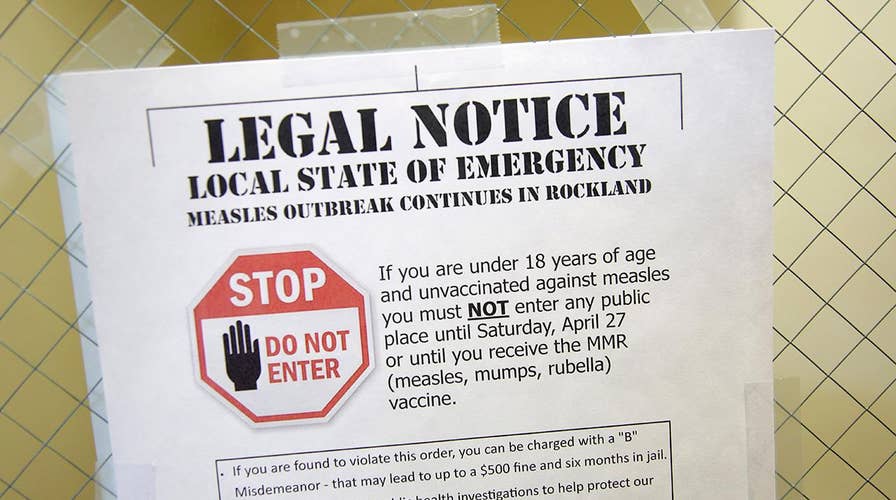New York City is experiencing the largest measles outbreak in the United States in decades, with as many as 285 confirmed cases since the fall and congregating predominately in a Brooklyn Orthodox community. Earlier this week, New York City officials even declared an emergency, requiring people in select Brooklyn zip codes to get vaccinated or face financial penalties.
Measles was eradicated in the United States in 2000 so why are we seeing an uptick in cases? The virus was reintroduced to the New York area when a non-vaccinated person became infected while traveling to Israel, a country with known low vaccination rates. The virus that causes measles, measles morbillivirus, is extremely contagious and can linger in the air and on surfaces for hours after an infected person is present. That means anyone not vaccinated is at extreme risk of becoming infected. As a result, there was a domino effect when the virus was brought to New York.
The anti-vaccine movement in the United States is also gaining thrust thanks in part to public personality Jenny McCarthy, who has suggested vaccinations were linked to her son’s diagnosis for autism.
ORTHODOX JEWS DECRY PUBLIC BACKLASH OVER MEASLES OUTBREAK
As a parent, I can wholeheartedly understand the concern when it comes to introducing something foreign to my children. We want nothing more than to keep our children healthy and protected. In America, we also support the idea of individualism, and many consider vaccinations a personal choice.
Nonetheless, I must explain that getting vaccinated doesn’t just protect your children, but everyone around them who may be too young, too old, or too sick to be vaccinated. There is a disconnect because of the emotion that has been injected into the anti-vaccine argument. And we can’t apply rationality to someone who isn’t thinking logically or rationally.
We need to choose our battles in this quest to keep our children safe and preserve our rights to individuality. And the first step in doing that is making sure the information and advice we are using to make decisions are scientifically proven.
McCarthy had a massive platform at the time of her son’s heart-rending diagnosis for autism, so when she correlated that diagnosis with “dangerous chemicals” in vaccines, panic among parents ensued. But how did McCarthy reach her medical conclusion? She told Oprah it was “mommy instinct” and that she hadn't wanted to vaccinate her son because of an article she had read recounting a study published inLancet. The study linked the vaccine to autism.
How could she know that the study she put so much weight into would be retracted and disproved? Interestingly, the symptoms her son experienced manifested after two seizure episodes.
Did she know that features of autism and epilepsy overlap, raising the question of whether there might be a biological link? Scientists have even concluded with sound studies that epilepsy is more common in people who also have autism. Similarly, autism is more common in those who have epilepsy and that children aged 18–24 months who have autism begin to regress if epilepsy appears, like what happened to McCarthy’s son.
Why was this hypothesis not the quest of McCarthy? The largest risk factors for autism are having an older parent, low birthweight, poor Apgar score, preterm birth, large head, and smoking during pregnancy; never is vaccinations listed as one
Half of all parents with small children have been exposed to misinformation about vaccines on social media, according to a new report finding the most common reason not to vaccinate is the fear of side effects. McCarthy herself admitted she started reading more about the links and trends of autism on Google ads.
The internet and digital media offer wonderful value as tools to help parents make informed decisions about their children’s health however we must ensure the information is credible and comes from reliable sources.
Vaccinations have repeatedly proven effective at saving millions of lives, and their safety has been verified.
The latest study from 2019 disproving the link between autism is also larger than many of its predecessors. Researchers analyzed data on 657,461 children and among that cohort, 6,517 were diagnosed with autism with the results indicating there was no increased risk of developing autism following vaccination. In fact, among girls, the risk of autism was lower in those who were vaccinated.
When it comes to our children, decisions can become emotional. Yes, it is difficult to watch our children cry when they get their vaccinations, because our instinct is to protect them. But we can’t lose sight of the bigger picture, which may result in more pain and even death if they don’t receive the vaccinations.
It's also important to know the MMR (measles, mumps and rubella) vaccine is different from the flu shot in the sense that the MMR vaccine is 97 percent effective in preventing infection while the flu shot varies from 20-60 percent effective. The skepticism of naysayers critical of the flu shot's efficacy doesn't hold up when it comes to measles.
CLICK HERE TO GET THE FOX NEWS APP
Vaccinations are one of the most powerful tools we have for protecting and improving the public’s health. They save innumerable lives every year.
The internet and digital media offer wonderful value as tools to help parents make informed decisions about their children’s health however we must ensure the information is credible and comes from reliable sources. When it comes to vaccines, the science is conclusive: vaccines are safe, effective, and can save your child’s life.









































